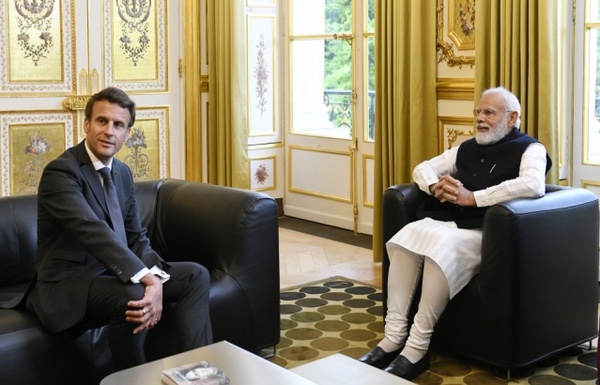How the India and France Space Strategic Dialogue can address multi-dimensional concerns in 2020sby Harini Madhusudan
|
| The dialogue is a natural step in the progress of the relations between the Indian and French space programs. |
The announcement raises several questions. One is how the two countries have cooperated in space prior to this agreement. Another involves the pretext for the strategic dialogue and the broader approach that it could entail.
The idea for the creation of the strategic dialogue was floated during the visit of the head of the newly created Space Command after the AsterX military exercise in 2021 involving space, and the visit of the French foreign minister in April. This is the such dialogue that France has established on space with an Asian country.
France and India share 57 years of relations in outer space. The countries work with each other as important partners in space applications and technology. What began in the 1960s as a bilateral technology and technical assistance mechanism has evolved to include critical technology cooperation, joint missions, and now passive militarization support. The Indian launchpad at Sriharikota was built with the assistance of France, and they remain the major supplier of components and equipment for the Indian space program. In the early 1970s, the Indo-French scientific collaboration helped ISRO’s Vikas rocket engine, which is based on the Viking 4A engine built by the French space agency CNES.
Over the five decades of this strategic relationship, the two countries have worked together on space component development, joint missions, joint radiation experiments, space-related education, and diplomacy. To commemorate 50 years of this relationship, the two countries released a stamp together in 2015.
That cooperation continues for India’s Gaganyaan human spaceflight program, with France providing assistance. During the visit of President Emmanuel Macron in 2018, the “India-France Joint Vision for Space Cooperation” was announced. In the same year, ISRO along with Arianespace launched the GSAT-11 satellite from Kourou in French Guiana. In January 2020, the two countries launched GSAT-30.
The two countries have undertaken two joint missions: Megha Tropiques (2011) and Saral Altika (2013). In March 2021, they announced a third joint mission focusing on Earth Observation. The mission is named TRISHNA and is a thermal infrared imager that works toward natural resource assessment. The OCEANSAT-3 mission also received French assistance with the ARGOS instrument. Presently, there have been discussions to set up a NAVIC navigation reference station in France.
It is in this context that the India-France Strategic Dialogue has come to fruition. The dialogue is a natural step in the progress of the relations between the Indian and French space programs.
| While the pretext given to the security dialogue is the growing threat of weaponization of space by China, the dialogue around security would be one dimensional if they don’t look beyond weaponization. |
Outer space has become a domain for strategic balance as well as a platform to promote new and emerging technologies. The new space age is a combination of collaborative private and semi-private initiatives with serious security concerns. In the case of India and France, both space powers have a long history of activities in the domain, however, their role in collective decision-making is minimal compared to Russia or the US.
For India and France, some of the primary security challenges emerge from the activities in Earth orbit, including the growing number of objects in orbit. While the pretext given to the security dialogue is the growing threat of weaponization of space by China, the dialogue around security would be one dimensional if they don’t look beyond weaponization.
In the decades ahead, the major security threats in space will include issues with radiofrequency interference, cyberattacks on satellites, and accidents resulting from collisions in orbit. In a broader sense, with private entities taking up space in the orbits, there would likely emerge issues of access to selected orbits. At the Moon and the asteroids, there would occur challenges of mining and ownership of resources. Again, the perceived security threats in this scenario would go beyond weaponization.
The Space Strategic Dialogue could essentially address, from a neutral viewpoint, the growing concerns of outer space becoming an active frontier of militarization among space powers. As seen in the case of the war in Ukraine, a heavy reliance on satellites in orbit has greatly helped Ukrainian troops defend against Russian advances. Legally, this would be seen as a breach of the principle of peaceful use of space. Other non-traditional security concerns such as debris, solar flares and other space weather threats, concerns from increased commercialization, and the reflection of terrestrial conflicts on space activities could be addressed by the dialogue to cover a wider spectrum of issues. Every space asset that serves dual purposes can be considered a weapon with the ability to cause irreversible damage, but it would be essential to prevent an intentional weaponization of outer space. Any growth in outer space should ensure they never deviate from the foundational principles set by the Outer Space Treaty.
Note: we are using a new commenting system, which may require you to create a new account.
